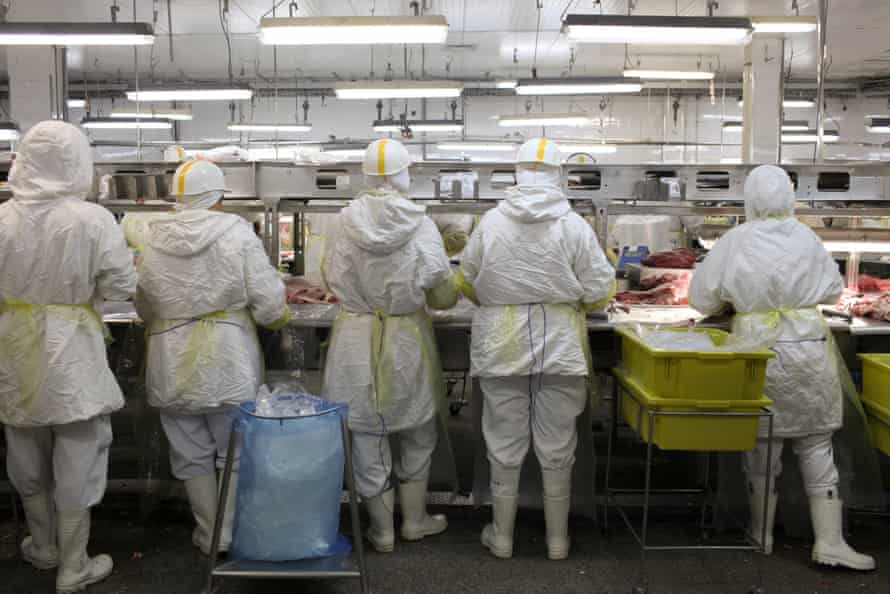Brazilian companies and slaughterhouses including the world’s largest meat producer, JBS, sourced cattle from supplier farms that made use of workers kept in slavery-like conditions, according to a new report.
Workers on cattle farms supplying slaughterhouses earned as little as £8 a day and lived in improvised shacks with no bathrooms, toilets, running water or kitchens, according to a report from Brazilian investigative agency Repórter Brasil.
Since 1995, the report said, 55,000 Brazilian workers have been rescued by government inspectors from “situations similar to slavery”. While the number of investigations has fallen in recent years – 118 workers were freed in 2018, compared with 1,045 a decade earlier – that does not mean the situation has improved, just that inspections have been reduced, it noted.

“We see this as an urgent problem that the big companies have to resolve,” said Marcel Gomes, executive secretary of Repórter Brasil and the report’s editor.
The report challenges meat companies such as JBS, which has faced criticism over its inability to control its supply chains of cattle farms in the Amazon.
A series of investigations by the Guardian, Repórter Brasil, the Bureau of Investigative Journalism and others have found the company bought cattle from so-called “direct supplier” farms that had sourced from “indirect suppliers” – farms that supply cattle to be fattened and slaughtered – that had been involved in illegal deforestation.
In September, JBS promised to control its entire supply chain by 2025 – 14 years after it and other Brazilian companies Minerva and Marfrig originally promised to do so. The three companies signed a deal in 2009 with Greenpeace in which they agreed not to buy cattle from farms “engaged in slavery”. Similar deals signed with federal prosecutors stopped them buying from farms included on a rolling government “dirty list” for keeping workers in slavery-like conditions.
In August 2019, government inspectors found nine unregistered workers clearing pasture on the Copacabana farm in Mato Grosso do Sul state were being paid £8 a day, the report said. They lived in improvised shacks made of logs, plastic, palm fronds and corrugated iron without toilets, kitchens or running water. The farm and its controller, Fernanda Thomazelli, were later included on the 2020 “dirty list”. The farm had sold cattle directly to two JBS slaughterhouses in 2019 and 2020.
In an out of court settlement with labour law prosecutors, Thomazelli’s father, José, representing his daughter, agreed to register the workers and provide proper living conditions. Notes from a meeting with prosecutors recorded he did not admit the existence of “work similar to slavery”. When contacted by the Guardian, he declined to comment and his daughter did not respond to an email.
JBS said it blocked Copacabana and two other farms listed in the report as soon as they appeared on the “dirty list”, following protocols agreed with prosecutors. “We have a zero-tolerance approach to forced labour and also urge anyone who suspects or has evidence of individual or farm-level malpractice to report it,” the company said.

The report also cited a farm in Tocantins state that sold to another farm in December 2018, two months after being included on the “dirty list” for keeping a 65-year-old worker in “deplorable conditions”. The second farm supplied a Minerva slaughterhouse in the state, the report alleges.
Minerva, Brazil’s second largest beef exporter, said it never did business with the offending farm and that the direct supplier farm was “qualified” to supply cattle. The company is investigating the case. “If any irregularity is found,” Minerva said, “we will take appropriate action.” Minerva is testing a tool called Visipec to control indirect suppliers.
Sign up for the Animals farmed monthly update to get a roundup of the best farming and food stories across the world and keep up with our investigations. You can send us your stories and thoughts at animalsfarmed@theguardian.com
The Link LonkJanuary 06, 2021 at 08:16PM
https://ift.tt/3ooZGuI
Brazilian beef farms ‘used workers kept in conditions similar to slavery’ - The Guardian
https://ift.tt/2RxTDX4
Beef

No comments:
Post a Comment